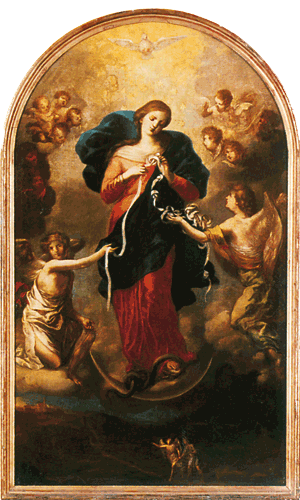The Knotty Entanglements of Sin

The two Collects given us by the liturgy this week — the first in the Extraordinary Form, and the second in the Ordinary Form — merit close attention.
On the Twenty-Third Sunday After Pentecost and the ferial days following it, we pray:
Absolve, quaesumus Domine, tuorum delicta populorum: ut a peccatorum nexibus, quae pro nostra fragilitate contraximus, tua benignitate liberemur.
Absolve, thy people from their transgressions, we beseech Thee, O Lord, so that through Thy goodness, we may be set free from the entanglements of those sins which in our weakness we have committed.
The verb, absolvo, can mean to loosen. The verb, contraho, can mean, among other things, to draw together tightly. Understood in this way, the Collect presents an astute psychology of sin. Sin is a knotty business, leading to hopelessly complex entanglements. There are, I think, in every life, sinful entanglements that only the patient and gentle hands of the Immaculate Virgin Mary can loosen.
Loosen, thy people from their transgressions,
we beseech Thee O Lord,
so that through Thy goodness working through the hands of the Virgin Mary,
we may be set free from the knotty entanglements of those sins
which in our weakness we have pulled together.
On the Twenty-Ninth Sunday Per Annum and the ferial days following it, we pray:
Omnipotens sempiterne Deus,
fac nos tibi semper et devotam gerere voluntatem,
et maiestati tui sincero corde servire.
Concise and elegant. The twofold petition follows immediately upon the address with no intermediate clause. I translated it, rather freely, this way:
Almighty and ever-living God,
make us ever bring Thee the devotion of our wills,
and wait upon Thy majesty
with singleness of heart.
The sense of the prayer is, it seems to me, that “adoration in spirit and truth” (Jn 4:23) requires the homage of the will ready to do God’s bidding. True devotion lies in obedience to the will of the Father. “Not every one that saith to me, Lord, Lord, shall enter into the kingdom of heaven: but he that doth the will of my Father who is in heaven, he shall enter into the kingdom of heaven” (Mt 7:21).
I was almost tempted to render the last line of the prayer, “and wait upon Thy majesty with guileless hearts,” for that, I would argue, is the meaning of sincero corde. Worship is most pleasing to God when we offer it on His terms, not on our own; when we go to it with no mental reservations and with childlike candour. “Then said I: Behold I come: in the head of the book it is written of me: that I should do thy will, O God” (Heb 10:7).

Dear Fr. Mark, this painting is of “Mary, Untier of Knots”, Devotion that comes from Augsburg, Germany. I kindly invite you and your readers to know more about it on:
http://www.desatadora.com.ar
Official site of the International Fraternity
+PAX